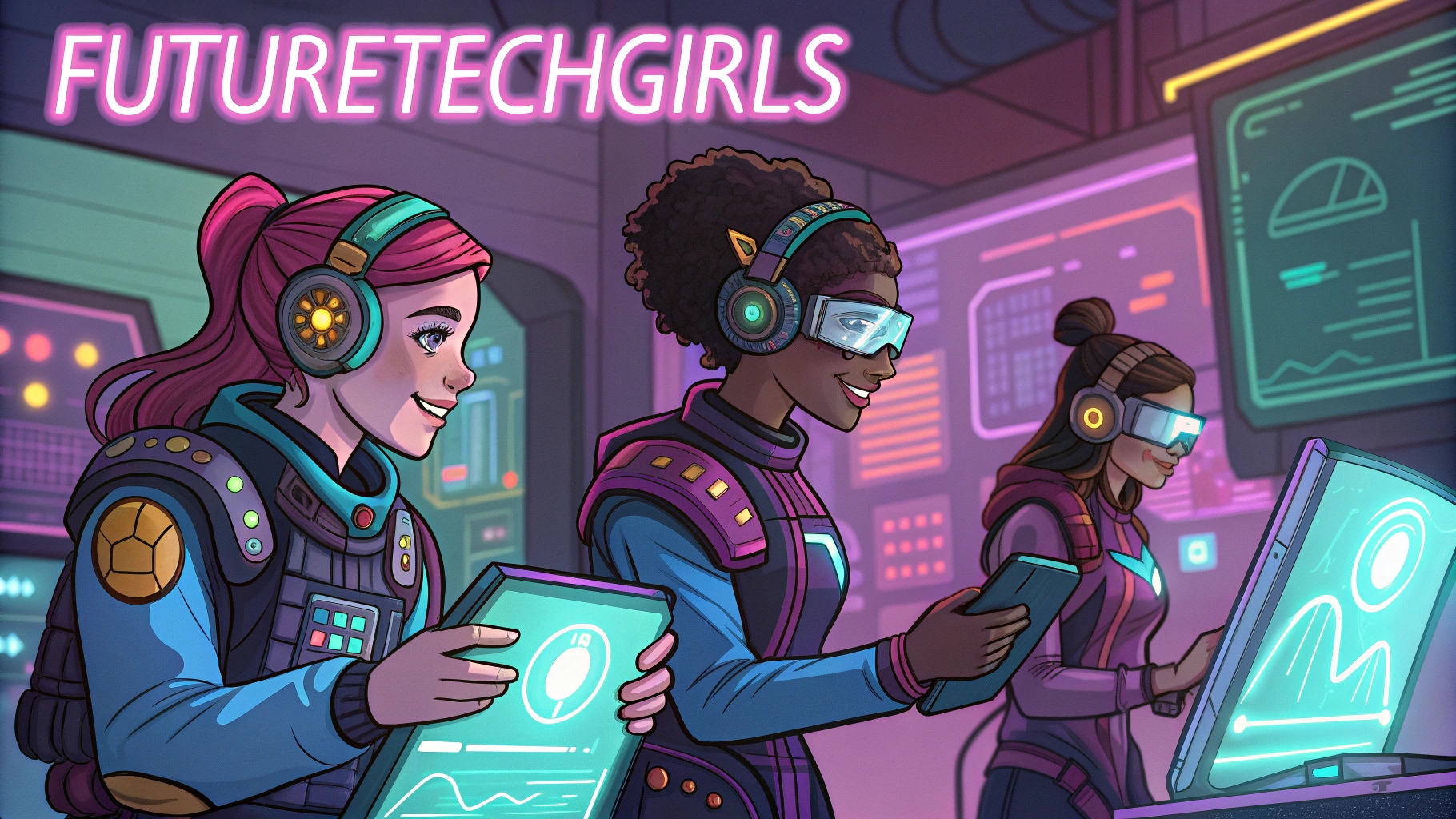The gaming industry is undergoing a revolutionary transformation. Long regarded as a male-dominated field, gaming culture is now embracing diversity—most notably through the meteoric rise of girls and young women who are reshaping the landscape.
We’ll call these innovators FutureTechGirls—trailblazers in game design, esport competitiveness, content creation, VR development, and tech entrepreneurship.
These FutureTechGirls aren’t just participating—they’re leading, redefining gaming genres, creating inclusive communities, and inspiring a new generation worldwide.
1. The New Face of Esports
Breaking Stereotypes
Female gamers have shattered long-standing stereotypes by competing at elite levels in a range of titles—Valorant, League of Legends, Fortnite, Overwatch 2, and Call of Duty. Trailblazers like Zainab “zAAz” Turkie, Katherine “Mystik” Gunn, Sasha “Scarlett” Hostyn, and Jorien “Sheep” van der Heijden have risen to prominence in both individual and mixed-gender competitions.
Professional Leagues and Mixed Teams
More esports leagues now include women’s divisions alongside usual mixed-gender rosters. For example, there are initiatives in Valorant’s VCT, free-to-play streetball games, and other tournaments that promote balanced representation. This shift is dismantling the outdated notion that professional gaming is a boys-only domain.
2. Content Creators & Streamers
Rising Through the Ranks
Platforms like Twitch, YouTube, and TikTok are overflowing with dynamic female gamers capturing audiences through gameplay streams, creative challenges, and lively commentary. Among them:
- Kathleen “Loserfruit” Belsten (Australia), known for her Fall Guys and Fortnite streams.
- Imane “Pokimane” Anys, one of Twitch’s most-followed creators, offering gaming content, IRL streams, and collaborative content with developers.
Authenticity Wins
These creators shine by being unapologetically themselves: genuine, humor-filled, and open about both wins and losses. They’ve built tight-knit fanbases and have influenced game developers to focus more on character customization options that go beyond stereotypes.
3. Game Development & Design
From Coders to CEOs
The presence of women in game development has flourished. Emerging game studios founded by women and female-led teams are pushing boundaries in VR gaming, indie platformers, simulation experiences, and more. Highlights include:
- Brenda Romero, veteran designer known for Wizardry and board-to-video game innovations.
- Rami Ismail, co-founder of the Octopath Studio, advocating heavily for inclusivity in both studios and game narratives.
- Young teams building immersive educational and therapeutic games aimed at mental health.
Diverse Narrative Voices
Games featuring emotional depth, social issues, and empathy-driven storytelling are rising. Titles like Life is Strange, Tell Me Why, and Celeste have been guided and influenced by female creative leads, demonstrating the importance of varied perspectives in game writing and direction.
4. VR, AR & Emerging Tech Innovation
Leading VR R&D
Female technologists and entrepreneurs are at the forefront of VR/AR, developing immersive new ways to play:
- Kat Holmes, former Microsoft inclusivity lead in mixed reality.
- Kathryn Newbury focusing on VR wellness and physical therapies.
- Startups founded by young women pioneering adaptive VR games for accessibility and rehabilitation.
Accessibility First
FutureTechGirls emphasize inclusive design—gesture-based controllers, customizable difficulty, subtitle options, and alternative input devices. Their goal: make immersive VR experiences accessible to gamers of all abilities.
5. Community Organizers & Advocates
Building Inclusive Spaces
Female-led communities and grassroots organizations are vital to inclusive gaming:
- Organizations like Girls Make Games, Black Girls CODE, and Women in Games International host workshops, camps, and mentorship programs.
- Esports leagues—like Women’s Esports League—offer tournaments where girls can compete without fear of harassment or undue stereotypes.
Campaigning for Better Policies
These advocates push for more responsible behavior from game platforms. They lead campaigns against harassment, champion comprehensive safety policies, and raise awareness about mental health and in-game toxicity.
6. Influencers & Crossover Stars
Merging Entertainment Mediums
Some FutureTechGirls crossover into mainstream entertainment, blending gaming, music, and pop culture:
- The group of creators called Team Queer hosts online events mixing cosplay, gaming, and LGBTQ+ representation.
- Musicians and dancers create gaming-inspired performances, sometimes streaming rhythm games and collaborative content on Twitch.
Bridging Online and Offline
Far from staying online, these influencers forge real-world connections—concerts, LAN festivals, pop-up arcades—and help destigmatize gaming as a serious cultural force.
7. Entrepreneurship: Startups & Funding
Women-Led Gaming Startups
Gen Z FutureTechGirls are launching indie studios, AR/VR therapy companies, audio-game developers for the visually impaired, and more. They seek funding through venture capital, Kickstarter, and local tech grants.
Mentoring & Networks
Programs like SheEO and Astia offer female founders mentorship, peer collaboration, and financial backing, essential for scaling innovative ideas.
Frequently Asked Questions
1. Who are some top FutureTechGirls in esports?
Players like Sasha “Scarlett” Hostyn and Zainab “zAAz” Turkie have excelled in global tournaments. They’re breaking gender barriers in competitive gaming.
2. Are there female-only gaming tournaments?
Yes, events like Valorant Game Changers and Women’s Esports League support all-female competitions. These create safe, inclusive competitive environments.
3. Can girls succeed as game developers?
Absolutely—many women now lead indie studios and major game titles. Their unique storytelling brings fresh perspectives to the industry.
4. How can girls start a career in gaming?
Begin with coding, game design courses, or streaming. Joining communities like Girls Who Code helps build skills and connections.
5. Are female gamers active in VR and AR?
Yes, women are innovating in immersive tech, from wellness games to accessible design. They lead startups and R&D labs globally.
6. What support exists for girls in gaming?
Groups like Girls Make Games and Women in Games offer mentorship, camps, and funding. These platforms empower and educate young gamers.
7. Do female streamers earn as much as males?
Top female streamers like Pokimane earn millions, but gender pay gaps still exist. Sponsorships and loyal fanbases help close the gap.
8. Are games becoming more inclusive for girls?
Yes, developers now include diverse characters, non-gendered avatars, and flexible storylines. Inclusion is a growing industry focus.
9. What are common challenges for FutureTechGirls?
Harassment, pay inequality, and underrepresentation remain issues. However, advocacy and visibility are helping shift the culture.
10. Can gaming be a positive career choice for girls?
Definitely—gaming offers careers in tech, media, design, and business. With growing support, more girls are turning passion into profession.
Conclusion
The rise of FutureTechGirls marks a transformative era in gaming. From esports champions to game developers and VR innovators, they’re reshaping every corner of the industry.
Their contributions are driving inclusivity, creativity, and technological advancement. Despite challenges, their impact continues to grow. As more opportunities open up, their leadership will define the future of gaming.
The game is no longer just changing—it’s being rewritten by FutureTechGirls.



















+ There are no comments
Add yours